|
|
|
Sort Order |
|
|
|
Items / Page
|
|
|
|
|
|
|
| Srl | Item |
| 1 |
ID:
116551
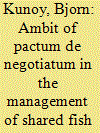

|
|
|
|
|
| Publication |
2012.
|
| Summary/Abstract |
The United Nations Convention on the Law of the Sea provides for a mechanism pursuant to which coastal States, having an interest in the fishery of a shared fish stock which straddles its maritime areas under national jurisdiction is obligated to undertake negotiations on joint conservation and management measures with the other relevant coastal States. Despite the evident benefits which arise from a joint conservation and management agreement, which can maintain or restore stocks to levels that can produce the maximum sustainable yield, such negotiations often prove difficult. However, relevant coastal States are inclined for self-interest purposes to seek to maximize their allocation which may lead to a stalemate, from which complex legal questions arise, given that the obligation to seek to agree on a conservation and management measure is an obligation of conduct, as opposed to result.
|
|
|
|
|
|
|
|
|
|
|
|
|
|
|
|
| 2 |
ID:
121639
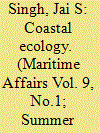

|
|
|
|
|
| Publication |
2013.
|
| Summary/Abstract |
Preservation and protection of coastal ecology and the marine environment are the most significant challenges before the world community. The UN Convention on the Law of Sea, 1982 has made extensive provisions for the protection and preservation of the marine environment. The Constitution of India is probably first in the world that makes provision for the preservation and protection of the environment. The Ministry of Environment and Forests undertook an exercise to issue the Coastal Regulation Zone Notification, 1991 to preserve, protect and promote coastal ecology. Furthermore, in a number of decisions, the Supreme Court has made effective observations for the proper preservation, protection and promotion of coastal ecology and the marine environment. The present paper highlights the problem of global warming, coastal ecology and the marine environment. Coastal States have a special interest in protecting and preserving their coastlines. Due to unique peculiar characteristics, the coastal zone is a meeting point for land, sea and inland waters. Coastal zones have played significant role in the development of culture and civilizations. It is the duty of the coastal States to preserve and protect coastal ecology and the marine environment.
|
|
|
|
|
|
|
|
|
|
|
|
|
|
|
|
| 3 |
ID:
102577


|
|
|
|
|
| Publication |
2011.
|
| Summary/Abstract |
This article addresses how the CLCS can curb the situations prohibited by Article 137(1) of UNCLOS, i.e. encroachment upon the Area. The CLCS is mandated by Article 76 to consider the submitted information that coastal States intend to use in establishing limits of outer continental shelves. When the inconsistency of the Submission with Article 76 is mishandled by the CLCS, encroachment may materialize. Being critical of the CLCS's decisions as to when to disqualify a controversial Submission, the scope of disputes under the CLCS Rules of Procedure has been unreasonably narrowed by practice and rendered inconsistent with Article 76(1). Consequently, encroachment is not discouraged. The author argues that a proper interpretation and application of Article 76(1) by the CLCS, while taking Article 121 as context, may prevent such an encroachment.
|
|
|
|
|
|
|
|
|
|
|
|
|
|
|
|
| 4 |
ID:
151899


|
|
|
| 5 |
ID:
132990
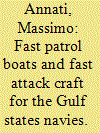

|
|
|
|
|
| Publication |
2014.
|
| Summary/Abstract |
The main tactical advantages of modern fast patrol boats (FPBs) and fast attack craft (FACs) are their versatility, high speed and excellent maneuverability, great striking power, small silhouette, and high degree of immunity to sea mines. Over decades, they have been the platforms of choice for a great number of mainly coastal states. Today the world wide demand especially for new FAC designs is growing exponentially.
|
|
|
|
|
|
|
|
|
|
|
|
|
|
|
|
| 6 |
ID:
116553


|
|
|
|
|
| Publication |
2012.
|
| Summary/Abstract |
In State practice, it is common for coastal States to claim maritime geographic features based on the principle of "land dominating the sea". International law recognizes such State practice as long as the related claims are consistent with the applicable international legal norms and rules. While it is relatively clear and recognizable that coastal States have the right to claim geographic features above the water, it remains controversial and unclear whether coastal States could have the right to claim submerged geographic features. It is the purpose of this article to discuss the issues concerning the claims to maritime geographic features to see whether a clearer way can be found to sort out the issues or whether these issues will remain a conundrum to international lawyers as well as to the whole international community.
|
|
|
|
|
|
|
|
|
|
|
|
|
|
|
|
| 7 |
ID:
121434
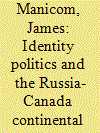

|
|
|
|
|
| Publication |
2013.
|
| Summary/Abstract |
The geopolitics of the Arctic region is viewed as a race for resources between coastal states. Yet, alarmist assessments are tempered by the reality that the most economically viable hydrocarbon reserves are entirely contained within the uncontested EEZs of the littoral states. Given this situation, confrontational rhetoric coming from Ottawa and Moscow seems not only troubling but peculiar. This article attempts to explain this peculiarity. It argues that leaders in both states seem willing to emphasise the ideational salience of disputed space to domestic audiences while downplaying their cooperative track record. The article finds mixed evidence of the instrumental use of national identity politics in Arctic issues, which often conflate distinct elements of Arctic geopolitics. While this dynamic has not yet prevented cooperation over disputed boundaries, perpetuation of these narratives may erode domestic support for dispute settlement.
|
|
|
|
|
|
|
|
|
|
|
|
|
|
|
|
| 8 |
ID:
157990
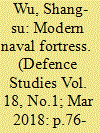

|
|
|
|
|
| Summary/Abstract |
As fixed facilities, naval fortresses seem unlikely to be important in a sea denial strategy which is usually about mobility, but new defence technologies and the changing geostrategic environment may revive the concept of the fortress. Extended ranges of anti-ship means allow onshore firepower to engage enemies over distance, even beyond the economic exclusive zones where most maritime territorial disputes occur. In the face of size limits on missile warheads that constrain their destruction of hardened targets, various active and passive defence technologies against missiles can enhance the survivability of onshore fortresses. Furthermore, onshore locations give fortresses the advantage of being unsinkable and able to accommodate greater energy and firepower capacity in contrast to vessels, as well as other mobile platforms. The onshore nature of fortresses also gives a different political meaning to being attacked, for the clear violation of sovereignty, as opposed to vessels and aircraft in a disputed space. However, the fact those fortresses are not invincible means cooperation with other existing capabilities still necessary. The case of Vietnam demonstrates how fortresses could strengthen the inferior defence capability of a coastal state vis-à-vis. a stronger sea power.
|
|
|
|
|
|
|
|
|
|
|
|
|
|
|
|
|
|
|
|
|